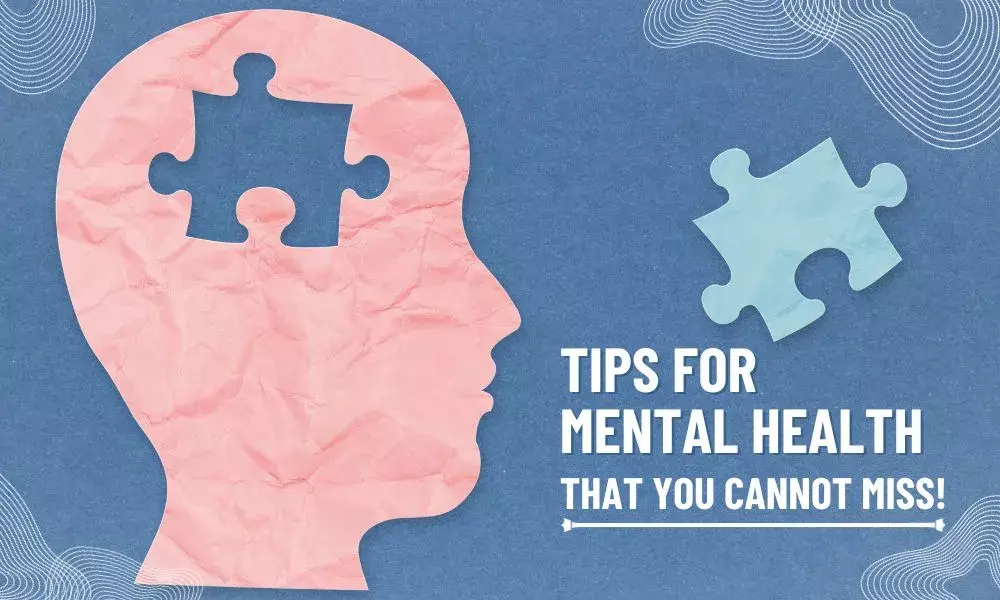Our overall well-being largely depends on both our physical and mental health. Mental health is equally crucial, as is our physical health. We tend to pay more attention to our physical health often as it directly affects our day-to-day work. On the contrary, a mental illness may not impact our functioning instantly. It instead percolates silently, erodes our mental well-being, and gradually impacts our overall health.
October 10th every year is recognized as Mental Health Day worldwide to raise awareness about the importance of mental health among the masses. Generally, people tend to avoid mental wellbeing because of lack of understanding.
Ignoring mental well-being can cause mental illnesses such as anxiety, eating disorders, depression, addictive behaviour, and schizophrenia.
Therefore, it is vital to care about mental well-being and stick to habits that are good for mental health. Here is a list of seven ways to have good mental health.
-
Love yourself
A strong mental health requires putting oneself above all things. It is essential to treat oneself with respect and kindness and avoid self-criticism. One must make time to explore new things and acquire newer skills and hobbies. Keeping oneself busy and broadening one’s horizons can help maintain good mental health. One may try solving puzzles, take dance lessons, learn to play an instrument, plant a garden, or learn a different language.
-
Setting realistic goals
One must decide what they want to achieve academically, professionally, and personally, and write down whatever it takes to achieve these goals. Setting realistic goals for oneself can help one stay grounded and prevent over-expectations. One must aim high but be realistic about things. With realistic goals, one may enjoy a tremendous sense of accomplishment and self-worth.
-
Take care of your body.
Physical fitness can improve our mental health, too. One must eat a balanced and nutritional diet and stay hydrated, as this has multiple health benefits. Additionally, exercising, staying physically active, maintaining a healthy weight, and having a good sleep pattern are crucial. One must have a healthy lifestyle and avoid smoking to prevent unnecessary health complications.
-
Connect with your Support network.
It is often observed that people with solid family ties or social connections are healthier than those who lack a strong family and friend network. Therefore, building a support system is vital. One must stay involved with social engagements involving family members and friends or activities that involve interacting with new people. This can help in keeping negative thoughts away.
-
Manage Stress
Stress has become a part of our lives. It is because of pressure that many mental health issues start. One must practice good coping skills to manage stress. Doing things like Tai Chi, meditation, breathing exercises, taking a nature walk, playing with pets, or journal writing as a stress reducer can help an individual manage stress. Further, one must remember to smile and have light moments in life. Laughter can boost our immune system, ease pain, relax our body, and reduce stress.
-
Avoid Overthinking
Good mental health does not imply always having happy thoughts. Sad or upsetting incidents are part of life. Good mental health means looking beyond a situation and staying calm during difficult times. The way we think about something has a significant effect on the way we feel. If we can handle a problem without much fuss, we feel good about it. It is all in our minds!
However, overthinking is a silent trap to mental illness. One must avoid overthinking as it can cause anxiety and emotional stress.
-
Seek Help
No one is perfect. Sometimes, we tend to over-expect ourselves and, fail to meet the expectations and feel low about it. It is, therefore, essential to have a support system and take help from others whenever required so that we do not overburden ourselves with trivial things.
To stay mentally healthy, we need help as we start feeling unwell. Accepting that we are mentally ill is the first step towards helping oneself. Mental health problems are more accessible to care and resolve when they are identified quickly. If one feels unwell and nothing seems to help, it is essential to talk to seek professional help or a counsellor.





